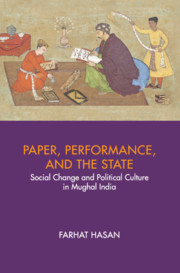Book contents
- Frontmatter
- Dedication
- Contents
- Acknowledgements
- List of Abbreviations
- A Note on Transliteration
- 1 Introduction
- 2 Property and Social Relations: Litigations and Disputes at the Qāzi's Court
- 3 Law as Contested Communication: Literacy, Performativity, and the Legal Order
- 4 Embodiment, Sensoriality, and the Public Sphere: Shifting Popular Perceptions of the State
- 5 State Formation from Below: Authority and Culture in Micro-Spaces
- 6 Towards a Conclusion: The Project of the Nation-State and the Mughal Historian
- Bibliography
- Index
2 - Property and Social Relations: Litigations and Disputes at the Qāzi's Court
Published online by Cambridge University Press: 07 August 2021
- Frontmatter
- Dedication
- Contents
- Acknowledgements
- List of Abbreviations
- A Note on Transliteration
- 1 Introduction
- 2 Property and Social Relations: Litigations and Disputes at the Qāzi's Court
- 3 Law as Contested Communication: Literacy, Performativity, and the Legal Order
- 4 Embodiment, Sensoriality, and the Public Sphere: Shifting Popular Perceptions of the State
- 5 State Formation from Below: Authority and Culture in Micro-Spaces
- 6 Towards a Conclusion: The Project of the Nation-State and the Mughal Historian
- Bibliography
- Index
Summary
This chapter is concerned with assessing the effects of state–society interactions in reshaping property relations, and in doing so it also seeks to see how a critical understanding of social conflicts and communications around properties helps us gain improved insights concerning the dynamic processes of state formation from below. Of course, historians are divided on what they actually mean by property, and one of the issues that divides them is whether to see property as a material relation or an ideational category. In a stimulating overview of the scholarship on proprietary rights, Faisal Chaudhry rightly points out that historians have constructed a duality between ‘property-as-ideational contingency’ and ‘property-as-irreducible material relation’. I tend to believe that this duality is largely fictive, for the ideational and the material are interrelated, and mutually constitutive, and it is certainly erroneous to see the materiality in property as ‘irreducible’ and ‘pre-determined’, or to see its ‘ideational’ dimensions as bereft of institutional correlates.
Even so, in Mughal historiography the dominant tendency is to focus on the material–institutional side of the divide, and set aside the social and cultural dimensions of land control and proprietary rights; it is for this reason that historians of the Mughal period look at property as a commodity, carrying an objective, formally determined value. Evidence of property transactions are, therefore, treated as a part of the story of the expansion of market, monetization of economy, and/or intensification of rational forms of exchange. Questioning the dominant Mughal historiography, I argue that modern perceptions of property, based in the commodity ethos and the notion of objective and exchangeable values, are not the appropriate framework to study property relations in the Mughal period. It is, of course, not the case that the property transactions in the period were entirely bereft of calculated interest and some sense of the ‘economic value’ of the property concerned, but these transactions could rarely, if ever, be seen as ‘market transactions’ occurring within formal and impersonal spaces, with ‘outsiders’, through exchanges that were based on some objective, commensurable standards of value. Exchange of property was more often seen as a transaction in prestige, one that compromised for the vendor the honour of his person and family, and, if the person purchasing it came from outside his social group, the honour of his community and kin as well.
- Type
- Chapter
- Information
- Paper, Performance, and the StateSocial Change and Political Culture in Mughal India, pp. 13 - 38Publisher: Cambridge University PressPrint publication year: 2021



